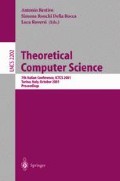Abstract
We formulate a narrowing-based decision procedure for E-unifiability. Termination is obtained requiring a narrowing bound: a bound on the length of narrowing sequences. We study general conditions under which the method guarantees that E-unifiability is in NP. The procedure is also extended to narrowing modulo AC (associativity and commutativity). As an application of our method, we prove NP-completeness of unifiability modulo bisimulation in process algebra with proper iteration, significantly extending a result in [8]. We also give (new) proofs, under a unified point of view, of NP-decidability of I, ACI, ACI1-unifiability and of unifiability in quasi-groups and central groupoids.
Work carried out within the MURST project TOSCA (Theory of concurrency, higher order and types)
Access this chapter
Tax calculation will be finalised at checkout
Purchases are for personal use only
Preview
Unable to display preview. Download preview PDF.
References
F. Baader and K. U. Schulz. Unification in the union of disjoint equational theories: combining decision procedures. Journal of Symbolic Computation, 21(2):211–244, 1996.
F. Baader and T. Nipkow. Term rewriting and all that. Cambridge University Press, 1998.
F. Baader, W. Snyder. Unification theory. In A. Robinson and A. Voronkov, editors, Handbook of automated reasoning, Elsevier Science Publishers B. V., 1999.
J. C. M. Baeten and W. P. Weijland. Process Algebra. Cambridge University Press, 1990.
H.-J. Bürckert. A resolution principle for a logic with restricted quantifiers. LNAI vol. 568, Springer Verlag, 1991.
A. Colmerauer. An introduction to PROLOG III. C. ACM 33, 69–90, 1990.
W. Fokkink. A complete equational axiomatization for prefix iteration. Information processing letters, 52(6):333–337, 1994.
Q. Guo, P. Narendran, and S. K. Shukla. Unification and Matching in process Algebras. In T. Nipkow, editor, Proceedings of 9th RTA, LNCS vol. 1379, 1998.
J.-M. Hullot. Canonical forms and unification. In W. Bibel and R. Kowalski, editors, Proceedings of the 5th International Conference on Automated Deduction, LNCS vol. 87, 318–334, 1980.
B. Intrigila, M. Venturini Zilli and E. Viola. Unification problems over process languages. Technical Report SI-00/01. Dipartimento di Scienze dell’Informazione, University of Rome “La Sapienza”, Rome, 2000.
J.-P. Jouannaud, C. Kirchner. Solving equations in abstract algebras: A rule-based survey of unification. In J.-L. Lassez and G. Plotkin, editors, Computational Logic: Essays in Honor of A. Robinson, MIT Press, Cambridge, MA, 1991.
D. Kapur and P. Narendran. Complexity of unification problems with associativecommutative operators. J. Automated Reasoning 9:261–288, 1992.
D. Kapur and P. Narendran. Matching, unification and complexity. SIGSAM Bulletin, 1987.
D. Kapur and P. Narendran. Double exponential complexity of computing complete sets of AC-unifiers. In Proceedings of the 7th Annual IEEE Symposium on Logic in Computer Science, Santa Cruz, California, 11–21, 1992.
C. Kirchner, H. Kirchner and M. Rusinowitch. Deduction with symbolic constraints. Revue d’Intelligence Artificielle (Special issue on Automatic Deduction), 4(3):9–52, 1990.
P. Narendran. Unification modulo ACI+1+0. Fundamenta Informaticae, 25(1):49–57, 1996.
R. Nieuwenhuis. On Narrowing, Refutation proofs and Constraints. In J. Hsiang, editor, Proceedings of 6th RTA, LNCS vol. 914, 1995.
R. Nieuwenhuis. Decidability and Complexity Analysis by Basic Paramodulation. Information and Computation 147:1–21, 1998.
M. Paterson, M. Wegman. Linear unification. Journal of Computer and System Sciences, 16(2):158–167, 1978.
G. Peterson, M. Stickel. Complete sets of reductions for equational theories with complete unification algorithms. Journal of the ACM 28(2):233–264, 1981.
G. Plotkin. Building-in Equational Theories. Machine Intelligence, 7:73–90 1972.
L. Vigneron. Automated Deduction Techniques for Studying Rough Algebras. Fundamenta Informaticae 33, 85–103, 1998.
E. Viola. E-unificabilità: decidibilità, complessità e algebre di processi. B. S. Thesis, Dipartimento di Scienze dell’Informazione, University of Rome “La Sapienza”, Rome, 2000.
Author information
Authors and Affiliations
Rights and permissions
Copyright information
© 2001 Springer-Verlag Berlin Heidelberg
About this paper
Cite this paper
Viola, E. (2001). E-unifiability via Narrowing. In: Theoretical Computer Science. ICTCS 2001. Lecture Notes in Computer Science, vol 2202. Springer, Berlin, Heidelberg. https://doi.org/10.1007/3-540-45446-2_27
Download citation
DOI: https://doi.org/10.1007/3-540-45446-2_27
Published:
Publisher Name: Springer, Berlin, Heidelberg
Print ISBN: 978-3-540-42672-1
Online ISBN: 978-3-540-45446-5
eBook Packages: Springer Book Archive

